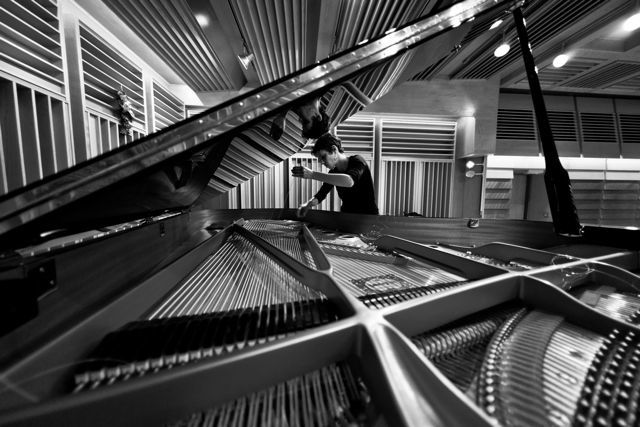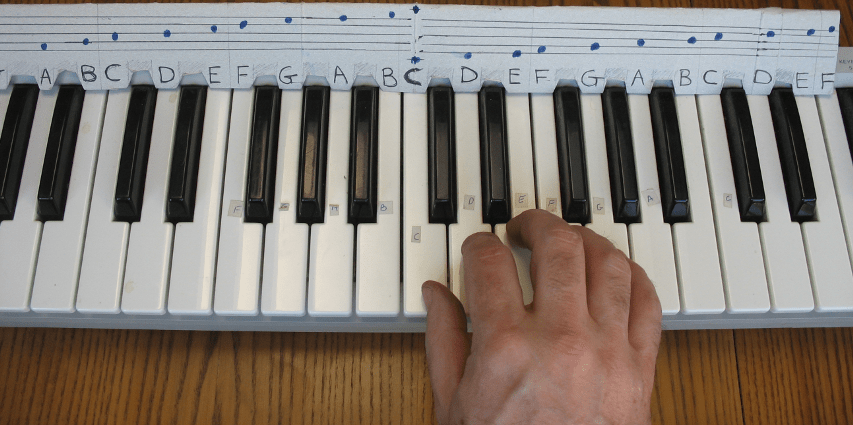Piano owners are inquisitive folks; they care for their piano and hardly hold back when they meet anybody who sounds like an expertise at piano playing, piano maintenance, or piano restoration. We’ve compiled the top piano care FAQs asked by enthusiastic piano owners, along with their crisp and straightforward answers.

How often do I need to tune my piano?
If you fear a clichéd ‘it depends’ as an answer, you are in the right place; you’ll only find crisp, clear, and correct answers here.
The standard practice is to tune your piano every 6 months. Unless you know what you’re doing, always have professionals tune your piano, because you don’t want to mess anything up with the complex machinery of your beloved instrument.
Pianists and music experts often recommend that you tune your piano thrice or three times a year, but it’s too expensive for most hobbyists! If you’ve just bought a new or second-hand piano, you might want to schedule a tuning session 3 times in the first year, followed by a regular regimen of biannual tuning.

Why exactly does the piano lose its tuning?
With fluctuations in temperature and humidity, the wood of the soundboard swells, and adds more pressure on the strings, thereby tightening them a bit more than what’s normal, and causing an increase in the pitch of the sound you get from your piano. Because of non-uniform exposure to fluctuating humidity and temperature, the strings go out of tune from each other. The tuning of the piano alters because of the movement of its parts, as well as regular usage. If the tuning pins are tight, their propensity to go out of tune is lesser than others.
How long does the tuning activity take?
Of course, this depends on how good or how bad the piano is when you take it to the tuner. The skills of the tuning service person also come into the picture here. However, most pianos need about a couple of hours to be tuned properly. A thorough tuning job will take up at least 90 minutes, if not more. So if your piano service person comes back to you within an hour and says that the job is done, you know that you need to have a word with him!
What’s ‘pitch raising’?
Before we answer this, let’s tell you what the perfect pitch of the piano is. The generally accepted target pitch for a piano is called the Concert Pitch, or A440. Normally, pianos are tuned to pitch slightly higher than A440, so that it can relax back and come closer to the target pitch. This is called pitch raising. After the pitch is raised, the piano is reputedly tuned till the time it achieves the perfect pitch and stays there. Mostly, you’ll need to seek pitch raising services if you buy an old piano, or return to your piano after a lengthy period of time (one year or more).
Tell me more on the concert pitch
The A440 is not a fancy codified name for the concert pitch. The ‘A’ here represents the A above middle C, and 440 refers to the vibration frequency. A piano with concert pitch, hence, is one whose A above middle C vibrates 440 times per second. This is the reference pitch from which all the other notes of the piano can be derived. All strings are then tuned in terms of this reference frequency, and result in a piano that’s perfectly tuned to the concert pitch.
What does ‘action’ mean?
The mechanism of the keys and the strings of the piano producing the sound that makes you a fan of the piano is called ‘action’. When you press your piano’s keys, the pressure from the finger sets several small parts in motion, which ultimately leads to the striking of the strings, triggering the amazing sound you hear. Professionals often refer to a piano’s response to its player as ‘action’.
You are now certified to use pianist lingo or vernacular when you talk to your friends from the piano classes.
Why do my piano’s keys stick?

Over time, because of exposure to high temperatures than what the material is supposed to bear, the keys can lose their shape and rub against each other, thus appearing to ‘stick’. Also, the clogging of dust between the edges of adjacent keys makes them look like they are ‘stuck’. Neither of these is a good situation but the fantastic news is both situations can be dealt with and pianos in this condition can be restored and brought back to harmonious and joyful life.
Featured Image: Image Credit
180-year-old piano likely in the Springfield parlor where Abraham Lincoln courted Mary Todd restored: https://t.co/IskQxXju0F
— The Associated Press (@AP) February 5, 2016
Inspiring! Video shows #Russian teen without hands playing beautiful piano song: https://t.co/JFX8lZemjfhttps://t.co/s2JeLO1bCW
— People’s Daily,China (@PDChina) February 4, 2016
Related Articles:
Piano Care Tips
Proper care and timely maintenance of piano is very important to prevent it from underperforming and to avoid any inconvenience. Over time, piano loses its sound, but proper maintenance and keeping it cleaned up and tuned up means it will give its beautiful sound in the long run. Following are some tips to take care of pianos properly:
Ø Piano’s tuning is very important, and it should be tuned atleast twice a year even it is not in use. There are above 200 strings in piano that make beautiful sound, so it is very important that you take services of a piano technician to tune up your piano as technicians are trained enough to adjust the tension of each string. Via Skate Info
Piano Care Tips
Here are seven of the most important piano care tips every piano owner needs to know to gain the most enjoyment from their beloved instrument. To extend the life of your piano, continue to heed these important reminders:
1) Keep your piano tuned on a regular basis. Piano manufacturers recommend four (4) initial tunings during the first year in service, and two (2) times per year thereafter.
A piano’s pitch falls every year due to the swelling and contraction of its soundboard. Via Total Piano Care
5 tips for taking care of your piano
A piano is an organic instrument made from many mechanical parts including wood – which expands and contracts depending on climate – as well as felt, cloth and wool. Each time it is played, its internal workings shift slightly. This means pianos do go out of tune and their sound may change over time.
These five top tips for piano care should help you keep your piano sounding its best. Via Piano Movers

